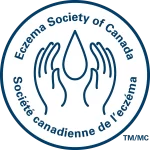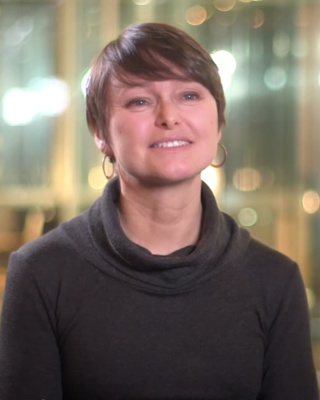Caring for the eczema caregiver

It is often said that eczema doesn’t just impact the sufferer – it impacts the whole family. Eczema can be complex and misunderstood, and caregivers often experience feelings of guilt, frustration, and helplessness as a result of caring for someone with eczema. The Eczema Society of Canada (ESC) understands this burden and wants to help. This resource was developed with support from registered psychologist Dr. Shawn Reynolds and dermatologist Dr. Michele Ramien to help Canadians who care for someone with eczema.
Caring for a child with eczema
Eczema can appear during infancy and carry on through childhood, adolescence, and into adulthood. For parents of children with eczema, the role of caregiver comes along unexpectedly and early. Having an infant with eczema can be a stressful and scary time, as parents are adjusting to not only caring for a baby, but a complex skin condition as well. As eczema sufferers enter childhood and adolescence, their needs change as do the responsibilities of the caregiver.
As eczema sufferers enter childhood and adolescence, their needs change as do the responsibilities of the caregiver. Each phase brings with it its own challenges and complexities, and the constant adaptation can be exhausting.
The unpredictable nature of eczema can also lead to feelings of anxiety, stress, and isolation for the caregiver. While these feelings are natural, they can take a toll on both the caregiver and their relationship with the child needing care.
Caring for an adult loved one with eczema
Parents are not the only caregivers to people with eczema. Partners, spouses, adult children, and other family members may be caregivers as well.
Eczema can be a very complex condition, and its chronic nature means it can occur through adulthood, and range in severity and duration. It can impact self-esteem, physical and mental health, and sleep. This can put a strain on intimacy, relationships, and family dynamics.
Communication is important, and working together to find ways to support one another can help navigate the challenges that come with a chronic condition.
Impact on caregivers
If you care for someone living with eczema, you are not alone. According to Statistics Canada more than 6.1 million Canadians are caregivers to a loved one.
Doctor’s appointments, pharmacy visits, skin care routines, and lifestyle modifications to avoid triggers can be physically and mentally draining. A recent study revealed that caregivers report frequent sleep disturbance, exhaustion, worry, and social isolation related to their loved one’s eczema.
This may sometimes feel overwhelming and put pressure on relationships. There are also financial consequences of managing eczema.
Canadian caregivers spent $12.6 million dollars per year related to their caregiving role, and many struggle to balance work and caregiving responsibilities.
HOW CAN I TAKE CARE OF MYSELF TOO?
Caring for a loved one with eczema can be challenging. You may need care too – whether it is self care, taking time for you, or even mental health support. Here are some suggestions that may help:
- Identify your role: Think about your role as caregiver, and all the things you are responsible for. Sometimes, acknowledging how much you do to help your loved one can help you feel more confident as a caregiver. However, it is also normal to feel tired sometimes. If you find you are feeling overwhelmed by your tasks, don’t wait to ask for help. Identify and ask for any support you may need, and look for areas where others might be able to help. Trouvez comment d’autres personnes pourraient vous aider.
- Identify what you may need: Think about all the tasks you need to carry out each day. Do some aspects cause stress, and are others manageable? Do some aspects cause stress, and are others manageable? For example, maybe bath time for your toddler with eczema is very enjoyable, but the application of topical medications after the bath is stressful. Take note of how these responsibilities make you feel, and areas where you could benefit from some extra help. Work with your health care provider to optimize the treatment regimen. Perhaps treatment can be adjusted to better control the sufferer’s eczema, reducing stress for both you and them.
- Seek help or support: Caregiving can be tiring, and sometimes taking a break is helpful. Don’t be afraid to ask for help from family and friends. It may also be helpful to tackle the more stressful aspects of care early in the day, when you are more rested and calm. Speak to your loved one’s health care provider, as they may have tips on how to make their treatment routine simpler or less stressful. Support can also be found by leaning on others. Find time to nurture your relationships. Sharing your feelings with people who will listen and understand can be an effective coping strategy.
- Take time for self care: It is important to take time for yourself and do things that help you to feel well. This may include exercise, meditation, journaling, prayer, or a hobby that brings you joy like listening to music, walking in nature, or painting. We know this can sometimes feel impossible, especially for parents of young children, but getting help from a babysitter or grandparents can help you recharge, increase patience, and lift your mood. As the saying goes: “You can’t pour from an empty cup”, so remember that taking a break here and there will likely benefit your loved ones too. When you care for yourself, you can care better for those you love.
A RECENT ESC SURVEY REVEALED:
- 55% of caregivers experience sleep loss 80% of caregivers struggle with their child’s skin care routine
- 80% of caregivers struggle with their child’s skin care routine
- 69% of caregivers experience anxiety related to their child’s condition
- 30% of caregivers report financial challenges related to managing their child’s disease
- 41% of caregivers feel like a failure when their child has a flare
Eczema Society of Canada thanks Dr. Shawn Reynolds, R Psych (Psychologist) and Dr. Michele Ramien, MD, FRCPC (Dermatology) for their volunteer contribution to this educational resource.
Disclaimer: Information provided in this resource does not constitute medical advice and is not intended to be used as a diagnostic tool. The information is up-to-date at time of publication. All medications, interventions, and treatment plans have risks and benefits, and it is important that individuals discuss their or their child’s specific health care needs with a qualified health care professional.
November 2020



